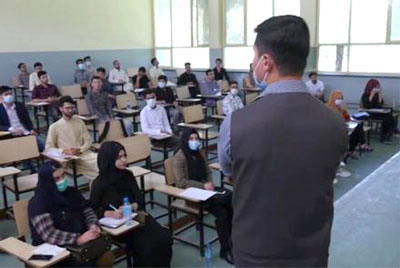The Ministry of Higher Education (MoHE) in a statement on Thursday called on Afghan university lecturers who left the country, to return to Afghanistan.
The ministry assured its full support of the returnees and to maintain their security.
Based on the reports, at least 229 lecturers with master’s degrees and PHDs from Kabul, Balkh and Herat universities fled the country since the collapse of the former government, however, the ministry of higher education has yet to release a specific figure about the teachers living abroad now.
“There is no security problem and the Islamic Emirate and Afghanistan welcome everybody who is coming to their country, the government will cooperate with them,” said Bilal Karimi.
Meanwhile, the teachers who are currently out of the country said they will not return, unless they see academic and professional leaders in the higher education sector.
“Unfortunately, a great vacuum is formed between scientific and professional figures and the leadership that is making decisions,” said Khalil Ahmad Kanjo, university lecturer.
“Another serious challenge is the salary which is paid to lecturers; the salary is low and they cannot advance their lives with this amount,” said Mahmood Marhoon, a lecturer.
The Ministry of Higher Education announced in late January that all public universities in warm areas are going to be opened on February 2nd and in cold areas on February 26th.
Earlier, the ministries said the university entrance exam, called as Kankor exam in Afghanistan, will be conducted normally countrywide except the amendment on university seats.
The plan has been approved by the cabinet, officials said.
“Some (students) have the capacity, but some does not have that. So, we bring those students (with low capacity) in another competition and provide them with facilities to help them stand and this will be implemented in all provinces,” said Mohammad Faisal Amin, a spokesman for Ministry of Higher Education.
The officials rejected the claims that the plan is aimed at allocation of university seats based on ethnicity and region.
“The goal of this plan is not the way that it has been spread on social media which say it is an allocation of seats on ethnicity or based on areas,” said Nooria Nazhat, a spokesperson for Ministry of Education.
Based on the plan the nationwide entry exam will be held for 75 percent of seats, but 25 percent of seats for a few important programs such as medicines, engineering, law, economy and agriculture which play a vital role in development, will be allocated for local students of in every province.
The Higher Education Ministry said a framework will be developed to introduce qualified students from all schools of a province to ministries of Education and Higher Education to attend a Kankor exam in provincial level to fill the 25 percent seats in their respective provinces.
The officials said they will also organize additional trainings for these students so that they will become experts in their fields and will work in their provincesin the future.
The ministries said by this move, they want to have local experts in medicine, engineering, law and political science, economy and business administration and agriculture who will work in their own provinces.
The plan was labeled unfair by social media users. Meanwhile, some lawmakers in the Wolesi Jirga, the Lower House of Parliament, also reacted to the issue.
“This outline from one hand is violating the rights of the new generation and those who work hard for learning and gaining knowledge, and from the other hand, it will confront Afghanistan’s future with serious risks and threats,” MP Ahmad Behzad said.
“All the people have equal rights for getting education. In a number of provinces where there is war and some parts are under control of the enemy, there is no opportunity for getting education. Brothers, let it (the outline) go forward,” MP Obaidullah Barekzai said.
The Higher Education Ministry statistics show that last year 250,000 students have graduated from schools of whom a small number of them were accepted in universities.










